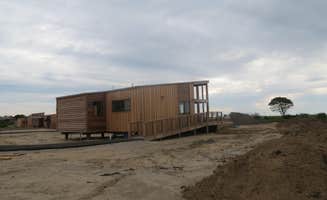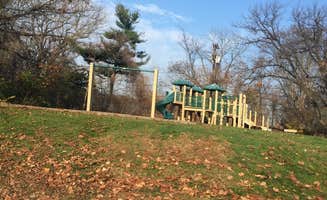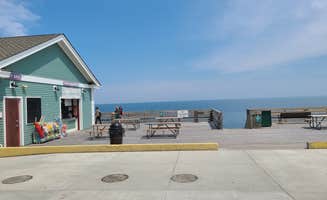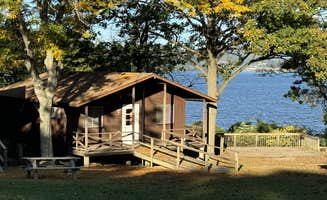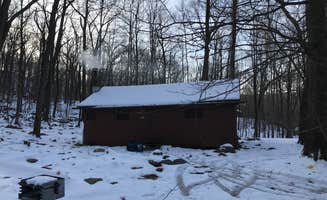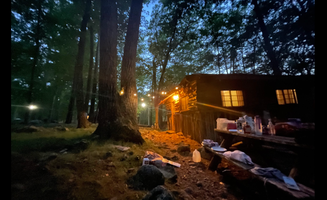Most New York Long Island cabin camping occurs on the south shore or inland nature preserves, with several options within 30-40 miles of Massapequa. The region sits at sea level with a maritime climate bringing humid summers and moderate winters. Sites at Long Island campgrounds often book 6-9 months in advance, particularly for waterfront cabin rentals during peak season.
What to do
Water activities at beach access points: Watch Hill Fire Island Campground provides direct beach access. "Beautiful location steps away from the beach. Listen to the waves crashing as you sleep and stargaze over the clear ocean," notes Inocencia O. The campground offers both designated campground spots and backcountry options.
Hiking on established trails: Wildwood State Park Campground maintains trails along the Long Island Sound. "There are hiking trails and you can walk to the beach. Note - it is a downhill walk to the beach. The beach is fairly clean and has a small boardwalk," says Giselle P. The park combines woodland paths with shoreline access.
Kayak rentals for water exploration: Heckscher State Park Campground provides water recreation options beyond swimming. "There is a place where you can rent a kayak," notes Giselle P. in her review. The park's waterfront location creates opportunities for paddling along protected bay areas.
What campers like
Clean facilities with modern amenities: The cabins at Heckscher State Park provide comfort without sacrificing the outdoor experience. A reviewer noted cabins include "an outside grill and picnic area. It is great if you are going with a group/family and people want to sleep inside a cabin as oppose to a tent outside."
Privacy between units: Watch Hill Fire Island Campground offers backcountry camping options for those seeking solitude. Emily S. shares, "You can get a permit to backcountry camp instead of reserving a designated campground spot. Just walk down to the beach after check-in and walk east until you see a pole with a tent symbol on it. After that you can choose where you want to set up camp."
Proximity to local attractions: Wildwood State Park positions campers near additional regional destinations. James O. points out it is "right at the entrance to wine country on Long Island and has a beach on the Long Island Sound." Other reviewers mention orchards and a waterpark within driving distance.
What you should know
Insect protection is essential: Mosquitoes present challenges at waterfront sites, particularly at Watch Hill. "We were getting attacked by mosquitoes and horseflies the entire weekend. Even with bug spray, the relief didn't last long. We couldn't even enjoy our meals at camp because it was that bad," warns Rosie R. Consider a screened shelter for eating areas.
Transportation limitations: Many cabin camping areas require ferry or boat access. Collective Governors Island is only accessible via ferry from Manhattan, creating logistical planning needs for equipment transport. Staten Island Gateway sites also have restricted access points.
Fire regulations vary significantly: Fire rings aren't standard at all sites. Elizabeth D. reports about Heckscher: "Was unaware there were no fire pits at the site so I would just bring your own. We made due with our charcoal grill provided at the site!" Some cabins include fire pits while others prohibit open flames completely.
Tips for camping with families
Playground access: Heckscher State Park offers dedicated recreation areas. "There is a playground just for the campground," notes Giselle P. However, at other locations like Sebago Cabin Camp, reviewers point out "playground is driving distance not walking."
Entertainment options: Several parks provide scheduled activities. According to Sara P., Sebago Cabin Camp has "a ton of activities like outdoor movies and communal bonfires on weekends. I was told by ranger Joe they also do Karaoke nights too." These structured programs supplement natural recreation.
Safety considerations: Most cabin camping areas maintain regular security patrols. Jessica C. mentions at Heckscher: "Rangers came around checking on everyone often so it really did feel incredibly safe." This provides comfort for families with younger children exploring the grounds.
Tips from RVers
Site selection for size requirements: Croton Point Park accommodates larger rigs but with specific placement restrictions. "We had a loosely defined gravel pad that was level. All sites appeared level. The FHU sites were back-to-back and although there were trees separating the sites, they were close together," notes Lee D.
Hookup availability: Water and electrical connections vary by location. Many cabins offer electric and water but lack sewer connections, requiring use of central facilities. "Clean but a bit dated. No shelves or hooks for toiletries," reports Lee D. about Croton Point facilities.
Reservation requirements: Advanced booking is crucial, especially for RV sites with hookups. Most campgrounds fill 3-6 months in advance during peak season, with weekend slots booking fastest. Reservation systems vary by park, with some requiring phone calls rather than online booking.


